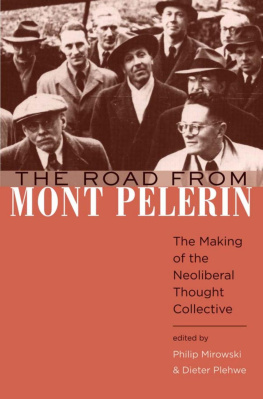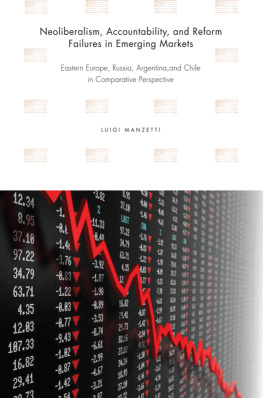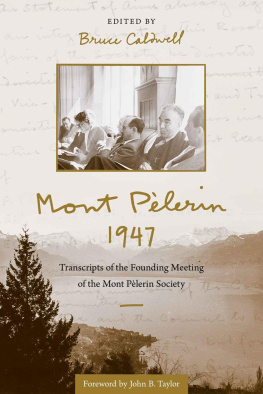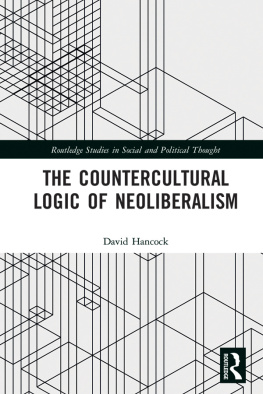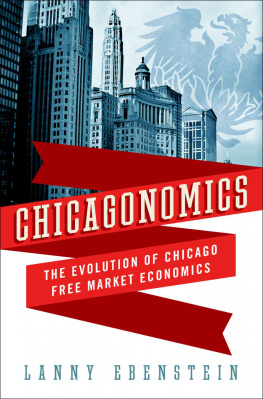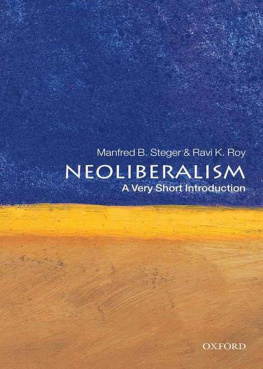Philip Mirowski - The Road From Mont Pèlerin: The Making of the Neoliberal Thought Collective
Here you can read online Philip Mirowski - The Road From Mont Pèlerin: The Making of the Neoliberal Thought Collective full text of the book (entire story) in english for free. Download pdf and epub, get meaning, cover and reviews about this ebook. year: 2009, publisher: Harvard University Press, genre: History. Description of the work, (preface) as well as reviews are available. Best literature library LitArk.com created for fans of good reading and offers a wide selection of genres:
Romance novel
Science fiction
Adventure
Detective
Science
History
Home and family
Prose
Art
Politics
Computer
Non-fiction
Religion
Business
Children
Humor
Choose a favorite category and find really read worthwhile books. Enjoy immersion in the world of imagination, feel the emotions of the characters or learn something new for yourself, make an fascinating discovery.
- Book:The Road From Mont Pèlerin: The Making of the Neoliberal Thought Collective
- Author:
- Publisher:Harvard University Press
- Genre:
- Year:2009
- Rating:4 / 5
- Favourites:Add to favourites
- Your mark:
The Road From Mont Pèlerin: The Making of the Neoliberal Thought Collective: summary, description and annotation
We offer to read an annotation, description, summary or preface (depends on what the author of the book "The Road From Mont Pèlerin: The Making of the Neoliberal Thought Collective" wrote himself). If you haven't found the necessary information about the book — write in the comments, we will try to find it.
What exactly is neoliberalism, and where did it come from? This volume attempts to answer these questions by exploring neoliberalisms origins and growth as a political and economic movement.
Although modern neoliberalism was born at the Colloque Walter Lippmann in 1938, it only came into its own with the founding of the Mont Plerin Society, a partisan thought collective, in Vevey, Switzerland, in 1947. Its original membership was made up of transnational economists and intellectuals, including Friedrich Hayek, Milton Friedman, George Stigler, Karl Popper, Michael Polanyi, and Luigi Einaudi. From this small beginning, their ideas spread throughout the world, fostering, among other things, the political platforms of Margaret Thatcher and Ronald Reagan and the Washington Consensus.
The Road from Mont Plerin presents the key debates and conflicts that occurred among neoliberal scholars and their political and corporate allies regarding trade unions, development economics, antitrust policies, and the influence of philanthropy. The book captures the depth and complexity of the neoliberal thought collective while examining the numerous ways that neoliberal discourse has come to shape the global economy.
The volumes contributors make heavy use of original archival materials and make good on the editors promise to expose the complexity, nuance and plurality of neoliberal thoughta belief system that has constructed and re-constructed itself and the world The Road from Mont Plerin is indispensable for anyone wishing to gain an understanding of neoliberalism, whether as an end in itself or as a means for constructing alternative, non-neoliberal futures.Daniel Kinderman, Critical Policy Studies
The Road from Mont Plerin reminds us that social movements succeed by drawing in many others who undertake the work that actually drives the movement forward. The book is full of stories of those individuals and related organizations that formed strategies, carried out the logistics and legwork, and brought legislators and others into contact with [Mont Plerin Society] ideas. In other words, if you work on post-war history of economics, there is almost no reason not to read this book.Ross B. Emmett, Journal of the History of Economic Thought
The Road from Mont Plerin uncovers and lays bare the origins of one of the most important political phenomena of our timethe development of the neoliberal discourse coalition that has come to shape the modern political economy.Frank Fischer, Rutgers University
This excellent book contributes significantly to our understanding of the origins of neoliberalism and its transformation into political discourse and policy.Steven Lukes, New York University
A fascinating and important book, one that speaks in radical, perceptive, and provocative ways to contemporary debates around neoliberalism.Jamie Peck, University of British Columbia
Philip Mirowski is Carl Koch Professor of Economics and the History and Philosophy of Science at the University of Notre Dame.
Dieter Plehwe is a Senior Fellow at the Social Science Research Centre Berlin.
Philip Mirowski: author's other books
Who wrote The Road From Mont Pèlerin: The Making of the Neoliberal Thought Collective? Find out the surname, the name of the author of the book and a list of all author's works by series.

